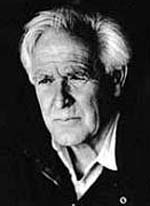  Spy Ink Spy Inkincludes
The Spy Fiction
Hall of Fame
|
|||
Cipher Room (Messageboard)
|
John le Carre
 John Le Carré is the pseudonym of David John Moore Cornwell, born on October 19th, 1931. He began his formal schooling at St Andrew's preparatory school near Pangbourne, Berkshire and at Sherborne School in England. From 1948-49, he studied at the University of Berne, developing a fascination for foreign languages, and then studied at Lincoln College, Oxford. He graduated from Lincoln College with a B.A. (with honours) in 1956. He then taught at Eton College for two years. Le Carré left Eton in 1959 and spent the next five years working for the British Foreign Service. He initially served as the Second Secretary in the British Embassy in Bonn, but was eventually moved to Hamburg where he served as a Political Consul. Ultimately, Le Carré was recruited into MI6. His first novel was written in 1961, while he was still a member of the service. John Le Carré is the pseudonym of David John Moore Cornwell, born on October 19th, 1931. He began his formal schooling at St Andrew's preparatory school near Pangbourne, Berkshire and at Sherborne School in England. From 1948-49, he studied at the University of Berne, developing a fascination for foreign languages, and then studied at Lincoln College, Oxford. He graduated from Lincoln College with a B.A. (with honours) in 1956. He then taught at Eton College for two years. Le Carré left Eton in 1959 and spent the next five years working for the British Foreign Service. He initially served as the Second Secretary in the British Embassy in Bonn, but was eventually moved to Hamburg where he served as a Political Consul. Ultimately, Le Carré was recruited into MI6. His first novel was written in 1961, while he was still a member of the service.In 1954, he married Alison Ann Veronica Sharp; they divorced in 1971. Together, they had three sons: Simon, Stephen and Timothy. In 1972, he married Valérie Jane Eustace, a book editor with Hodder and Stoughton; this marriage produced one son, Nicholas.
Le Carré's career as a secret agent was destroyed by Kim Philby, a British double agent, who blew the cover of tens of British agents to the KGB. Years later, Le Carré carefully depicted and analysed Philby's weakness and deceit in the guise of "Gerald", the mole hunted by George Smiley in the central novel of Le Carré's œuvre, Tinker, Tailor, Soldier, Spy.
Le Carré's work is in many ways a critical and reasoned response to the lurid sensationalism of the James Bond genre of spy writing. His heroes are three-dimensional, their engagement with the world altogether more realistic, and their circumstances markedly unglamorous. He is widely hailed as writing some of the most literary and philosophically significant spy novels of the 20th century.
His works also differ from the Bond books in that they are morally relativist; there are constant reminders of the fallibility of western espionage systems and western countries in general, often with the implication that the Soviet bloc and the NATO bloc are essentially two sides of the same coin. The over-simplicity of the good-versus-SPECTRE world of Ian Fleming has no place in Le Carré's work, where the spies seem to serve espionage more than any ideology. Le Carré is more interested in the uncertainty inherent in spycraft -- the most unimpeachable information from the enemy might always prove to be bait or a trap, a logic that tends to render the information obtained far less useful. In short, his books leave behind an unmistakable air of skepticism.
In 1965, Martin Ritt directed the first film adaptation of a Le Carré novel, The Spy Who Came in From the Cold. Richard Burton was cast as the novel's protagonist, Alec Leamas. The following year, in 1966, Sidney Lumet directed The Deadly Affair, a film adaptation of Le Carré's novel Call for the Dead. Later, in 1969, Frank Pierson directed a film adaptation of The Looking Glass War.
A decade later, in 1979, the BBC adapted the first novel in the Quest for Karla trilogy, Tinker, Tailor, Soldier, Spy, into a television miniseries in which Alec Guinness starred as George Smiley. On the DVD release, Le Carré says this was his favorite filmed adaptation of his work. Three years later, in 1982, the Alec Guinness reprised his role in a BBC adaptation of the final book in the trilogy, Smiley's People. The middle novel, The Honourable Schoolboy, was never adapted for film or television.
In 1984, Diane Keaton appeared in an adaptation of The Little Drummer Girl. Three years later, in 1987, A Perfect Spy was adapted into a television mini series. In 1990, Sean Connery was cast as the protagonist in Fred Schepisi's film adaptation of The Russia House. The following year, in 1991, A Murder of Quality was adapted by Gavin Millar for television. A decade later, in 2001, Pierce Brosnan, the contemporary Bond, was cast as the lead spy in The Tailor of Panama.
In 2005, the film The Constant Gardener was released, based on his novel. The story is set in slums in Kibera and Loiyangalani, Kenya. The situation affected the crew to the extent that they set up the Constant Gardener Trust in order to provide basic education around these villages. Le Carré is a patron of the charity. (Wikipedia)
External Links
Call for the Dead (1961)
A Murder of Quality (1962)
The Spy Who Came In from the Cold (1963)
The Looking-Glass War (1965)
A Small Town in Germany (1968)
Tinker, Tailor, Soldier, Spy (1974)
The Honourable Schoolboy (1977)
Smiley's People (1979)
The Little Drummer Girl (1983)
A Perfect Spy (1986)
The Russia House (1989)
The Secret Pilgrim (1991)
The Night Manager (1993)
Our Game (1995)
The Tailor of Panama (1996)
The Constant Gardener (2001)
Absolute Friends (2003)
|
||